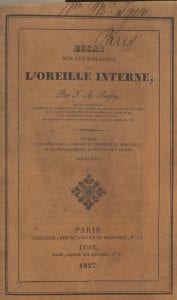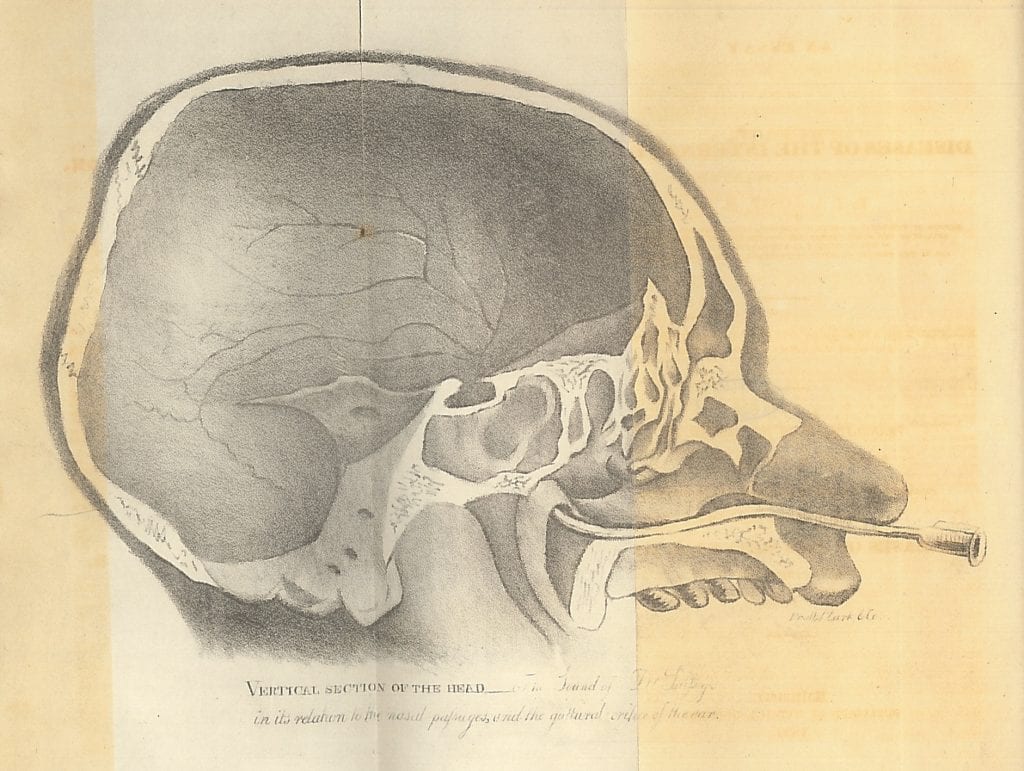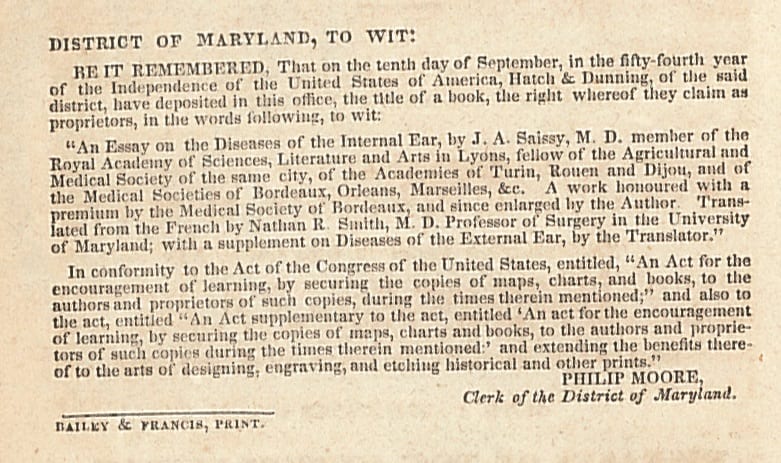“Deafness, like gutta serena, is sometimes produced by inordinate seminal discharges” Antoine Saissy 1756-1822
By H Dominic W Stiles, on 22 September 2017
 Born on the 2nd of February 1756, in Mougins, near Grasse in Provence, Jean Antoine Saissy had originally intended to become a planter, but coming across some medical books, he determined on a medical career, travelling to Paris to study (Montain, p.8ff). He was then twenty two years old, with only a village education, combined with his own book-learning (ibid.p.9). From 1777 to 1782 he studied under various famous professors, including Chopart and Pelletan. He went on to serve as a physician and surgeon major with the Compagnie royale d’Afrique on the Barbary coast. He attended to a child of the ‘Dey of Constantinople’ (possibly an error for Bey of Constantin?), who wanted him to stay. Saissy however, returned to France, and in 1789 (the English version says 1798 which seems to be an error) defended his thesis on inoculation for small pox before the ‘Chirugical College of Lyons,’ and became a Doctor of Medicine with the University of Valence. He married the daughter of M. Thenance, a doctor who had invented some obstetric forceps, and devoted himself to that area of medicine for a time. In 1810 he wrote an essay on Croup, one of the first to do so.
Born on the 2nd of February 1756, in Mougins, near Grasse in Provence, Jean Antoine Saissy had originally intended to become a planter, but coming across some medical books, he determined on a medical career, travelling to Paris to study (Montain, p.8ff). He was then twenty two years old, with only a village education, combined with his own book-learning (ibid.p.9). From 1777 to 1782 he studied under various famous professors, including Chopart and Pelletan. He went on to serve as a physician and surgeon major with the Compagnie royale d’Afrique on the Barbary coast. He attended to a child of the ‘Dey of Constantinople’ (possibly an error for Bey of Constantin?), who wanted him to stay. Saissy however, returned to France, and in 1789 (the English version says 1798 which seems to be an error) defended his thesis on inoculation for small pox before the ‘Chirugical College of Lyons,’ and became a Doctor of Medicine with the University of Valence. He married the daughter of M. Thenance, a doctor who had invented some obstetric forceps, and devoted himself to that area of medicine for a time. In 1810 he wrote an essay on Croup, one of the first to do so.
He seems to have been a polymath, in 1811 presenting at the Institut de France a ‘memoir’ on the extraction of light by the condensation of gas. Quite what that means I am not sure. He also worked on a study of hibernation, with dormice and marmots (ibid p.12 -13).
It was not until the last twelve years of his life that he devoted himself to diseases of the ear. Weir and Mudry tell us that Saissy was “the first person to propose introducing a piece of catgut into an artificial perforation of the tympanic membrane to avoid its closure.”
In his introduction to deafness, he repeats this curious form of treatment;
A Bavarian bath-keeper, mentioned by Sckinkius,* devised a singular method of curing deafness. He plunged the patient into a warm bath, to produce turgescence in the little veins which run behind the ear. When these were sufficiently apparent he opened them with the point of a lancet and drew a considerable quantity of blood, to the great relief of the patients on whom he practised the evacuation. This remedy may have some success in cases of sanguineous plethora of the organ of hearing. (p.24-5)
As his 4th of 15 listed causes of deafness, Saissy says
Deafness, like gutta serena, is sometimes produced by inordinate seminal discharges. Sylvaticus cites a remarkable instance of deafness supervening upon excessive indulgence in venereal pleasures. (p.21)
In other words, it makes you deaf as well as blind! I suppose that he is not thinking of veneral disease, which can have those effects.
Saissy died on the 5th of March, 1822. He seems to have been rather forgotten but is deserving of better treatment than I have space or time to give him here.
 Above, the only illustration in his book, a section of the head showing it is a vertical section.
Above, the only illustration in his book, a section of the head showing it is a vertical section.
As an addendum, it is interesting to note the protection of copyright notice given by the U.S.A. in the front of the English translation from Maryland.
 *Schenkius, a Swiss doctor (1530-98)
*Schenkius, a Swiss doctor (1530-98)
Saissy, J.A., Essai sur les maladies de l’oreille interne. Paris, (1827) [first published in a briefer essay in 1819]
Saissy, Antoine, An Essay on the Diseases of the Internal Ear. Baltimore, (translated, 1829)
Montain, Biographic Notice, in An Essay on the Diseases of the Internal Ear, p.9-15.
Mudry, Albert. The tympanostomy tube: An ingenious invention of the mid 19th century. International Journal of Pediatric Otorhinolaryngology Volume 77, Issue 2, February 2013, p. 153-157
Weir, Neil, & Mudry, Albert. Otorhinolaryngology, An Illustrated History, 2013.
 Close
Close

